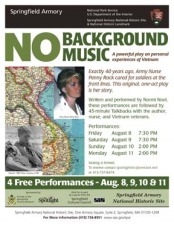"No Background Music"
Play at Springfield Armory Aug. 8-11 exposes the "horror and beauty" of conflict
By Debbie Gardner
PRIME Editor
As an Army nurse stationed in Vietnam during the late 1960s, Penny Rock lived a side of war few civilians will ever see, much less understand.
"When you see films and oftentimes read books or [view] TV programs, you hear and see things that take place during the battle," Rock told PRIME. "My experiences are the things that take place after the battle."
She learned just how utterly destroyed a human body can become.
How the deepest wounds aren't necessarily those that can be stitched or sewn or bandaged.
Decades after living through what she called "the gore and the beauty" of war, Rock shared her battlefield writings, her memories and her nightmares with Berkshire-based playwright, Normi Noel.
The result was a play titled "No Background Music."
Aug. 8-11, Noel will bring her one-act work to the Springfield Armory for four free performances, Fri. and Sat. at 7:30 p.m., Sun. and Mon. at 2. p.m. (Call 737-8474 to reserve a seat)
And Rock, accompanied by experts on aspects of war and its effects on a culture, will be at every performance, ready to talk with and listen to audience members after the curtain comes down.
About "No Background Music"
The one-act play, written over a twelve-year period, is based upon Noel's interviews with Rock, a trip the two took to Vietnam, and letters and tapes Rock had preserved from her tour of duty.
The title "No Background Music" came from a conversation the playwright and Rock had during their 1995 trip to Vietnam, when Rock said, "Normi, there's no background music in war . you don't have contrived sound effects or strings and violins and singers coming onstage."
Siguorney Weaver read the roll of the Penny Rock-inspired character in a BBC Radio production of the play in 2005.
In August of 2006, Lenox-based Shakepeare & Co. produced Noel's play as a part of its summer repertoire.
The Armory performances are being produced by In the Spotlight with support from the Friends of the Springfield Armory and the Springfield Cultural Council.
The true cost of war
Prime spoke with Rock about the play from her offices in California, where the onetime aspiring opera singer (a tropical disease ruined her voice) and battle-tested nurse now runs a consulting company specializing in business turnarounds.
She talked openly about what she sees as the message of Noel's work that there is an immensurable human cost to war.
Any war.
"If you're going to have a war, there's going to be consequences," Rock said bluntly. "[Consequences] in the form of human beings who are no longer physically, mentally or psychologically the same as they were."
She said this fact seems to come as a surprise to many of the folks back home, who often expect returning vets to just pick up the threads of their lives and are mystified when their loved one has trouble adjusting to civilian life, or holding a job, or recovering their sense of humor.
But, Rock said, these returning soldiers are often thrust back into a society that has no point of reference for what they have experienced.
"If you're not in that circumstance, you don't know what it feels like and smells like and sounds like," she said. "There is a reintegration that needs to occur for these [vets] in body, mind and spirit."
But wounds do heal
Still Rock said exposure to the horrors of war doesn't necessarily mean that returning vets will be permanently "wounded.".
"It doesn't mean that [he or she] won't be a highly functioning individual," Rock said. "But there is a cost to that individual, whether it's a year or two years or more [of healing]."
"There is no expiration date on when people are supposed to be back to normal," she said.
In her case, it was 25 years before she talked openly with Noel about what she had experienced in Vietnam.
But that didn't mean Rock didn't come to terms with her wartime experiences long before the play was written.
"You don't have to deny that experiences are horrible . that's what I mean by integration," Rock said. "You take all the things you've experienced and live with [them]. That means it's all part of who I am."
"There's nothing that life provides that isn't a lesson," she continued. "It's never too late to learn a lesson. It's never too late to heal."
